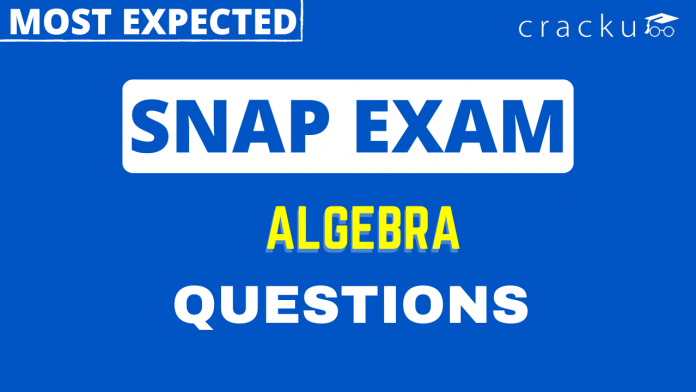SNAP Algebra Questions PDF [Most Important]
Here you can download a free Algebra Questions PDF with answers for SNAP 2022 by Cracku. These questions will help you to practice and solve the Algebra questions in the SNAP exam. Utilize this PDF practice set, which is one of the best sources for practising and includes detailed answers.
Download Algebra Questions for SNAP
Enroll to SNAP 2022 Crash Course
Question 1: If $x + \frac{4}{x} – 4 = 0$, then the value of $x^2 – 4$ is equal to:
a) 0
b) 4
c) 2
d) 1
1) Answer (A)
Solution:
Given, $x+\frac{4}{x}-4=0$
$\Rightarrow$ $x^2+4-4x=0$
$\Rightarrow$ $\left(x-2\right)^2=0$
$\Rightarrow$ $x-2=0$
$\Rightarrow$ $x=2$
$\therefore\ $ $x^2-4=2^2-4=4-4=0$
Hence, the correct answer is Option A
Question 2: If $x + \frac{1}{x} = 5, x \neq 0$ then the value of $\frac{x^4 + \frac{1}{x^2}}{x^2 – 3x + 1}$ is equal to:
a) 50
b) 65
c) 60
d) 55
2) Answer (D)
Solution:
Given, $x + \frac{1}{x} = 5$
$\frac{x^4+\frac{1}{x^2}}{x^2-3x+1}=\frac{x\left(x^3+\frac{1}{x^3}\right)}{x\left(x-3+\frac{1}{x}\right)}$
$=\frac{x^3+\frac{1}{x^3}}{x+\frac{1}{x}-3}$
$=\frac{\left(x+\frac{1}{x}\right)^3-3\left(x+\frac{1}{x}\right)}{5-3}$
$=\frac{\left(5\right)^3-3\left(5\right)}{2}$
$=\frac{125-15}{2}$
$=\frac{110}{2}$
$=55$
Hence, the correct answer is Option D
Question 3: If $x = 3 + 2 \sqrt 2 $, then the value of $x^2 + \frac{1}{x^2}$ is
a) 36
b) 32
c) 30
d) 34
3) Answer (D)
Solution:
Given, $x=3+2\sqrt{2}$
$\Rightarrow$ $\frac{1}{x}=\frac{1}{3+2\sqrt{2}}\times\frac{3-2\sqrt{2}}{3-2\sqrt{2}}$
$\Rightarrow$ $\frac{1}{x}=\frac{3-2\sqrt{2}}{9-8}$
$\Rightarrow$ $\frac{1}{x}=3-2\sqrt{2}$
$\left(x+\frac{1}{x}\right)^2=\left(3+2\sqrt{2}+3-2\sqrt{2}\right)^2$
$\Rightarrow$ $x^2+\frac{1}{x^2}+2=6^2$
$\Rightarrow$ $x^2+\frac{1}{x^2}+2=36$
$\Rightarrow$ $x^2+\frac{1}{x^2}=34$
Hence, the correct answer is Option D
Question 4: If $p + \left(\frac{1}{p}\right) = 2$ find the value of $p \times p \times p$
a) 8
b) 4
c) 1
d) 2
4) Answer (C)
Solution:
Given, $p+\left(\frac{1}{p}\right)=2$
$\Rightarrow$ $p^2+1=2p$
$\Rightarrow$ $p^2-2p+1=0$
$\Rightarrow$ $\left(p-1\right)^2=0$
$\Rightarrow$ $p-1=0$
$\Rightarrow$ $p=1$
$\therefore\ $ $p\times p\times p=1\times1\times1=1$
Hence, the correct answer is Option C
Question 5: If a + b + c + d = 2, then the maximum value of (1 + a)(1 + b)(1 + c)(1 + d) is
a) $\frac{91}{9}$
b) $\frac{63}{22}$
c) $\frac{54}{13}$
d) $\frac{81}{16}$
5) Answer (D)
Solution:
Given, a + b + c + d = 2
We know that, AM $\ge\ $ GM
$\Rightarrow$ Arithmetic mean of (1 + a),(1 + b),(1 + c),(1 + d) $\ge\ $ Geometric mean of (1 + a),(1 + b),(1 + c),(1 + d)
$\Rightarrow$ $\frac{\left(1+a\right)+\left(1+b\right)+\left(1+c\right)+\left(1+d\right)}{4}\ge\left[\ \left(1+a\right)\left(1+b\right)\left(1+c\right)\left(1+d\right)\right]^{\frac{1}{4}}$
$\Rightarrow$ $\frac{4+a+b+c+d}{4}\ge\left[\left(1+a\right)\left(1+b\right)\left(1+c\right)\left(1+d\right)\right]^{\frac{1}{4}}$
$\Rightarrow$ $\frac{4+2}{4}\ge\left[\left(1+a\right)\left(1+b\right)\left(1+c\right)\left(1+d\right)\right]^{\frac{1}{4}}$
$\Rightarrow$ $\frac{6}{4}\ge\left[\ \left(1+a\right)\left(1+b\right)\left(1+c\right)\left(1+d\right)\right]^{\frac{1}{4}}$
$\Rightarrow$ $\left[\left(1+a\right)\left(1+b\right)\left(1+c\right)\left(1+d\right)\right]^{\frac{1}{4}}\le\ \frac{3}{2}$
$\Rightarrow$ $\left(1+a\right)\left(1+b\right)\left(1+c\right)\left(1+d\right)\le\ \left(\frac{3}{2}\right)^4$
$\Rightarrow$ $\left(1+a\right)\left(1+b\right)\left(1+c\right)\left(1+d\right)\le\ \frac{81}{16}$
$\therefore\ $Maximum value of (1 + a)(1 + b)(1 + c)(1 + d) = $\frac{81}{16}$
Hence, the correct answer is Option D
Question 6: If the value of $\frac{3x\sqrt y + 2y\sqrt x}{3x\sqrt y – 2y\sqrt x} – \frac{3x\sqrt y – 2y\sqrt x}{3x\sqrt y + 2y\sqrt x}$ is same as that of $\sqrt x \sqrt y,$ then which of the following relations between x and y is correct?
a) 9x + 4y = 36
b) 9x + 4y = 24
c) 9x – 4y = 36
d) 9x – 4y = 24
6) Answer (D)
Solution:
Given, $\frac{3x\sqrt{y}+2y\sqrt{x}}{3x\sqrt{y}-2y\sqrt{x}}-\frac{3x\sqrt{y}-2y\sqrt{x}}{3x\sqrt{y}+2y\sqrt{x}}=\sqrt{x}\sqrt{y}$
$=$> $\frac{\left(3x\sqrt{y}+2y\sqrt{x}\right)^2-\left(3x\sqrt{y}-2y\sqrt{x}\right)^2}{\left(3x\sqrt{y}\right)^2-\left(2y\sqrt{x}\right)^2}=\sqrt{x}\sqrt{y}$
$=$> $\frac{9x^2y+4y^2x+12xy\sqrt{x}\sqrt{y}-\left[9x^2y+4y^2x-12xy\sqrt{x}\sqrt{y}\right]}{9x^2y-4y^2x}=\sqrt{x}\sqrt{y}$
$=$> $\frac{24xy\sqrt{x}\sqrt{y}}{xy\left(9x-4y\right)}=\sqrt{x}\sqrt{y}$
$=$> $\frac{24}{9x-4y}=1$
$=$> $9x-4y=24$
Hence, the correct answer is Option D
Question 7: If $\frac{4}{1 + \sqrt2 + \sqrt 3} = a + b\sqrt 2 + c \sqrt 3 – d\sqrt 6,$ where a, b, c, d are natural numbers, then the value of a + b + c + d is:
a) 1
b) 0
c) 2
d) 4
7) Answer (D)
Solution:
Given, $\frac{4}{1 + \sqrt2 + \sqrt 3} = a + b\sqrt 2 + c \sqrt 3 – d\sqrt 6$
$=$> $\frac{4}{1+\sqrt{2}+\sqrt{3}}\times\frac{1+\sqrt{2}-\sqrt{3}}{1+\sqrt{2}-\sqrt{3}}\ =a+b\sqrt{2}+c\sqrt{3}-d\sqrt{6}$
$=$> $\frac{4\left(1+\sqrt{2}-\sqrt{3}\right)}{\left(1+\sqrt{2}\right)^2-\left(\sqrt{3}\right)^2}=a+b\sqrt{2}+c\sqrt{3}-d\sqrt{6}$
$=$> $\frac{4\left(1+\sqrt{2}-\sqrt{3}\right)}{1+2+2\sqrt{2}-3}=a+b\sqrt{2}+c\sqrt{3}-d\sqrt{6}$
$=$> $\frac{4\left(1+\sqrt{2}-\sqrt{3}\right)}{2\sqrt{2}}=a+b\sqrt{2}+c\sqrt{3}-d\sqrt{6}$
$=$> $\frac{4\left(1+\sqrt{2}-\sqrt{3}\right)}{2\sqrt{2}}\times\frac{\sqrt{2}}{\sqrt{2}}=a+b\sqrt{2}+c\sqrt{3}-d\sqrt{6}$
$=$> $\frac{4\sqrt{2}\left(1+\sqrt{2}-\sqrt{3}\right)}{2\left(\sqrt{2}\right)^2}=a+b\sqrt{2}+c\sqrt{3}-d\sqrt{6}$
$=$> $\frac{4\sqrt{2}\left(1+\sqrt{2}-\sqrt{3}\right)}{2\times\ 2}=a+b\sqrt{2}+c\sqrt{3}-d\sqrt{6}$
$=$> $\sqrt{2}\left(1+\sqrt{2}-\sqrt{3}\right)=a+b\sqrt{2}+c\sqrt{3}-d\sqrt{6}$
$=$> $\sqrt{2}+2-\sqrt{6}=a+b\sqrt{2}+c\sqrt{3}-d\sqrt{6}$
$=$> $2+\sqrt{2}-\sqrt{6}=a+b\sqrt{2}+c\sqrt{3}-d\sqrt{6}$
Comparing both sides
a=2, b=1, c=0, d=1
$\therefore\ $a + b + c + d = 2 + 1 + 0 + 1 = 4
Hence, the correct answer is Option D
Question 8: If $x = 1 + \sqrt 2$, then find the value of $\sqrt x + \left(\frac {1}{\sqrt x}\right)$.
a) 2.1014
b) 2.1973
c) 1.9996
d) 1.9876
8) Answer (B)
Solution:
Given,
$x = 1 + \sqrt 2$
$=$> $\frac{1}{x}=\frac{1}{1+\sqrt{2}}$
$=$> $\frac{1}{x}=\frac{1}{1+\sqrt{2}}\times\frac{\sqrt{2}-1}{\sqrt{2}-1}$
$=$> $\frac{1}{x}=\frac{\sqrt{2}-1}{2-1}$
$=$> $\frac{1}{x}=\sqrt{2}-1$
$\therefore\ $ $\left(\sqrt{x}+\frac{1}{\sqrt{x}}\right)^2=x+\frac{1}{x}+2$
$=$> $\left(\sqrt{x}+\frac{1}{\sqrt{x}}\right)^2=1+\sqrt{2}+\sqrt{2}-1+2$
$=$> $\left(\sqrt{x}+\frac{1}{\sqrt{x}}\right)^2=2\sqrt{2}+2$
$=$> $\left(\sqrt{x}+\frac{1}{\sqrt{x}}\right)^2=4.8284$
$=$> $\sqrt{x}+\frac{1}{\sqrt{x}}=2.1973$
Hence, the correct answer is Option B
Question 9: If $a^3 + b^3 = 20$ and $a + b = 5$, then find the value of $a^4 + b^4$.
a) 26
b) 23
c) 25
d) 24
9) Answer (B)
Solution:
Given, $a^3 + b^3 = 20$ ………..(1)
$a + b = 5$
$=$> $\left(a+b\right)^3=5^3$
$=$> $a^3+b^3+3ab\left(a+b\right)=125$
$=$> $20+3ab\left(5\right)=125$
$=$> $15ab=105$
$=$> $ab=\frac{105}{15}$
$=$> $ab=7$ ……………………..(2)
$a + b = 5$
$=$> $\left(a+b\right)^2=5^2$
$=$> $a^2+b^2+2ab=25$
$=$> $a^2+b^2+2\left(7\right)=25$
$=$> $a^2+b^2=25-14$
$=$> $a^2+b^2=11$………………(3)
$\therefore\ $ $\left(a^3+b^3\right)\left(a+b\right)=\left(20\right)\left(5\right)$
$=$> $a^4+a^3b+b^3a+b^4=100$
$=$> $a^4+b^4+ab\left(a^2+b^2\right)=100$
$=$> $a^4+b^4+\left(7\right)\left(11\right)=100$
$=$> $a^4+b^4+77=100$
$=$> $a^4+b^4=100-77$
$=$> $a^4+b^4=23$
Hence, the correct answer is Option B
Question 10: If x + y = 4, xy = 2, y + z = 5, yz = 3, z + x = 6 and zx = 4, then find the value of $x^3 + y^3 + z^3 — 3xy$.
a) 151.75
b) 152.75
c) 153.75
d) 150.75
10) Answer (C)
Solution:
Given,
$x+y=4$ and $xy=2$
$y+z=5$ and $yz=3$
$z+x=6$ and $zx=4$
$x^3 + y^3 + z^3 — 3xy$ = $\left(x+y+z\right)\left(x^2+y^2+z^2-xy-yz-zx\right)$
= $\frac{2}{2}\left(x+y+z\right)\frac{2}{2}\left(x^2+y^2+z^2-xy-yz-zx\right)$
= $\frac{1}{2}\left(2x+2y+2z\right)\frac{1}{2}\left(2x^2+2y^2+2z^2-2xy-2yz-2zx\right)$
= $\frac{\left(x+y\right)+\left(y+z\right)+\left(z+x\right)}{2}.\frac{\left(x^2+y^2+2xy+y^2+z^2+2yz+z^2+x^2+2zx-4xy-4yz-4zx\right)}{2}$
= $\frac{\left(4\right)+\left(5\right)+\left(6\right)}{2}.\frac{\left(\left(x+y\right)^2+\left(y+z\right)^2+\left(z+x\right)^2-4\left(2\right)-4\left(3\right)-4\left(4\right)\right)}{2}$
= $\frac{15}{2}.\frac{\left(4^2+5^2+6^2-8-12-16\right)}{2}$
= $\frac{15}{2}.\frac{\left(16+25+36-36\right)}{2}$
= $\frac{15}{2}.\frac{41}{2}$
= $153.75$
Hence, the correct answer is Option C
Take SNAP mock tests here
Enrol to 10 SNAP Latest Mocks For Just Rs. 499
Question 11: What will come at place of x, (x < 10) for $\frac{(132 \div 12 \times x – 3 \times 3)}{(5^2 – 6 \times 4 + x^2)} = 1$ ?
a) 3
b) 1
c) 4
d) 2
11) Answer (B)
Solution:
$\frac{(132\div12\times x-3\times3)}{(5^2-6\times4+x^2)}=1$
$=$> $\frac{(11\times x-3\times3)}{(25-6\times4+x^2)}=1$
$=$> $\frac{11x-9}{25-24+x^2}=1$
$=$> $\frac{11x-9}{1+x^2}=1$
$=$> $11x-9=1+x^2$
$=$> $x^2-11x+10=0$
$=$> $x^2-10x-x+10=0$
$=$> $x\left(x-10\right)-1\left(x-10\right)=0$
$=$> $\left(x-10\right)\left(x-1\right)=0$
$=$> $x=10$ or $x=1$
Given $x < 10$
$=$> $x=1$
Hence, the correct answer is Option B
Question 12: If $x + y = 4$ and $x^3 + y^3 = 12,$ then the value of $x^4 + y^4 = $?
a) $\frac{146}{3}$
b) $\frac{146}{9}$
c) $\frac{146}{7}$
d) $\frac{146}{5}$
12) Answer (B)
Solution:
Given, $x^3 + y^3 = 12$ ………..(1)
$x + y = 4$
$=$> $\left(x+y\right)^3=4^3$
$=$> $x^3+y^3+3xy\left(x+y\right)=64$
$=$> $12+3xy\left(4\right)=64$
$=$> $12xy=52$
$=$> $xy=\frac{52}{12}$
$=$> $xy=\frac{13}{3}$ ……………………..(2)
$x + y = 4$
$=$> $\left(x+y\right)^2=4^2$
$=$> $x^2+y^2+2xy=16$
$=$> $x^2+y^2+2\left(\frac{13}{3}\right)=16$
$=$> $x^2+y^2=16-\frac{26}{3}$
$=$> $x^2+y^2=\frac{22}{3}$………………(3)
$\therefore\ $ $\left(x^3+y^3\right)\left(x+y\right)=\left(12\right)\left(4\right)$
$=$> $x^4+x^3y+y^3x+y^4=48$
$=$> $x^4+y^4+xy\left(x^2+y^2\right)=48$
$=$> $x^4+y^4+\left(\frac{13}{3}\right)\left(\frac{22}{3}\right)=48$
$=$> $x^4+y^4+\frac{286}{9}=48$
$=$> $x^4+y^4=48-\frac{286}{9}$
$=$> $x^4+y^4=\frac{432-286}{9}$
$=$> $x^4+y^4=\frac{146}{9}$
Hence, the correct answer is Option B
Question 13: If x – y = 13 and xy = 25, then the value of $x^2 – y^2$ = ?
a) $13 \sqrt 240$
b) $13 \sqrt 229$
c) $13 \sqrt 269$
d) $13 \sqrt 210$
13) Answer (C)
Solution:
Given,
$x – y = 13$ and $xy = 25$
$=$> $\left(x-y\right)^2=13^2$
$=$> $x^2+y^2-2xy=169$
$=$> $x^2+y^2+2xy-4xy=169$
$=$> $\left(x+y\right)^2-4xy=169$
$=$> $\left(x+y\right)^2-4\left(25\right)=169$
$=$> $\left(x+y\right)^2-100=169$
$=$> $\left(x+y\right)^2=269$
$=$> $x+y=\sqrt{269}$
$\therefore\ $ $x^2-y^2=\left(x+y\right)\left(x-y\right)=\left(\sqrt{269}\right)\left(13\right)=13\sqrt{269}$
Hence, the correct answer is Option C
Question 14: If a + b = 8 and ab = 12, then the value of $a^3 + b^3$ is:
a) 512
b) 224
c) 288
d) 96
14) Answer (B)
Solution:
Given, $a+b=8$ and $ab=12$
$=$> $\left(a+b\right)^3=8^3$
$=$> $a^3+b^3+3ab\left(a+b\right)=512$
$=$> $a^3+b^3+3\left(12\right)\left(8\right)=512$
$=$> $a^3+b^3+288=512$
$=$> $a^3+b^3=512-288$
$=$> $a^3+b^3=224$
Hence, the correct answer is Option B
Question 15: If a and b are two positive real numbers such that $4a^2 + b^2 = 20$ and ab = 4, then the value of 2a + b is:
a) 80
b) 8
c) 6
d) 5
15) Answer (C)
Solution:
Given, $4a^2 + b^2 = 20$ and $ab = 4$
$=$> $4a^2+b^2+4ab-4ab=20$
$=$> $\left(2a\right)^2+b^2+2.2a.b-4ab=20$
$=$> $\left(2a+b\right)^2-4ab=20$
$=$> $\left(2a+b\right)^2-4\left(4\right)=20$
$=$> $\left(2a+b\right)^2-16=20$
$=$> $\left(2a+b\right)^2=20+16$
$=$> $\left(2a+b\right)^2=36$
$=$> $2a+b=6$
Hence, the correct answer is Option C
Question 16: If $x + \frac{1}{x} = 4,$ then the value of $x^4 + \frac{1}{x^4} $ is :
a) 16
b) 196
c) 194
d) 14
16) Answer (C)
Solution:
Given, $x + \frac{1}{x} = 4$
$=$> $\left(x+\frac{1}{x}\right)^2=4^2$
$=$> $x^2+\frac{1}{x^2}+2.x.\frac{\ 1}{x}=16$
$=$> $x^2+\frac{1}{x^2}+2=16$
$=$> $x^2+\frac{1}{x^2}=14$
$=$> $\left(x^2+\frac{1}{x^2}\right)^2=14^2$
$=$> $x^4+\frac{1}{x^4}+2.x^2.\frac{\ 1}{x^2}=196$
$=$> $x^4+\frac{1}{x^4}+2=196$
$=$> $x^4+\frac{1}{x^4}=196-2$
$=$> $x^4+\left(\frac{1}{x}\right)^4=194$
Hence, the correct answer is Option C
Question 17: 2x — 3y is a factor of:
a) $4x^2 + 2x – 3y + 9y^2 – 12xy$
b) $4x^2 + 9y^2 + 12xy$
c) $8x^3 + 27y^3$
d) $4x^2 + 2x – 3y + 36y^2 + 12xy$
17) Answer (A)
Solution:
$4x^2 + 2x – 3y + 9y^2 – 12xy=4x^2+9y^2-12xy+2x-3y$
$=\left(2x-3y\right)^2+2x-3y$
$=\left(2x-3y\right)\left(2x-3y+1\right)$
$\therefore\ $ $2x+3y$ is factor of $4x^2 + 2x – 3y + 9y^2 – 12xy$
Hence, the correct answer is Option A
Question 18: (ax + by) is a factor of:
a) $a^2 x^2 + 2ab – b^2 y^2$
b) $a^2 x^2 + 2abxy + b^2 y^2$
c) $a^2 x^2 + 2ab + b^2 y^2$
d) $a^2 x^3 + 2abx + b^2 y^2 x$
18) Answer (B)
Solution:
$\left(ax+by\right)\left(ax+by\right)=\left(ax+by\right)^2=a^2x^2+2abxy+b^2y^2$
$\therefore\ $ $(ax+by)$ is a factor of $a^2 x^2 + 2abxy + b^2 y^2$
Hence, the correct answer is Option B
Question 19: If a and b are two positive real numbers such that a + b = 20 and ab = 4, then the value of $a^3 + b^3$ is:
a) 7760
b) 8000
c) 8240
d) 240
19) Answer (A)
Solution:
Given, $a+b=20$ and $ab=4$
$=$> $\left(a+b\right)^3=20^3$
$=$> $a^3+b^3+3ab\left(a+b\right)=8000$
$=$> $a^3+b^3+3\left(4\right)\left(20\right)=8000$
$=$> $a^3+b^3+240=8000$
$=$> $a^3+b^3=8000-240$
$=$> $a^3+b^3=7760$
Hence, the correct answer is Option A
Question 20: The factors of the expression $2x^2 – 5x – 12$ are:
a) (x + 4) and (2x+ 3)
b) (x + 4) and (2x — 3)
c) (x — 4) and (2x — 3)
d) (x — 4) and (2x + 3)
20) Answer (D)
Solution:
$2x^2 – 5x – 12 = 2x^2-8x+3x-12$
$=2x\left(x-4\right)+3\left(x-4\right)$
$=\left(x-4\right)\left(2x+3\right)$
$\therefore\ $The factors of the expression $2x^2 – 5x – 12$ are $(x — 4)$ and $(2x + 3)$





